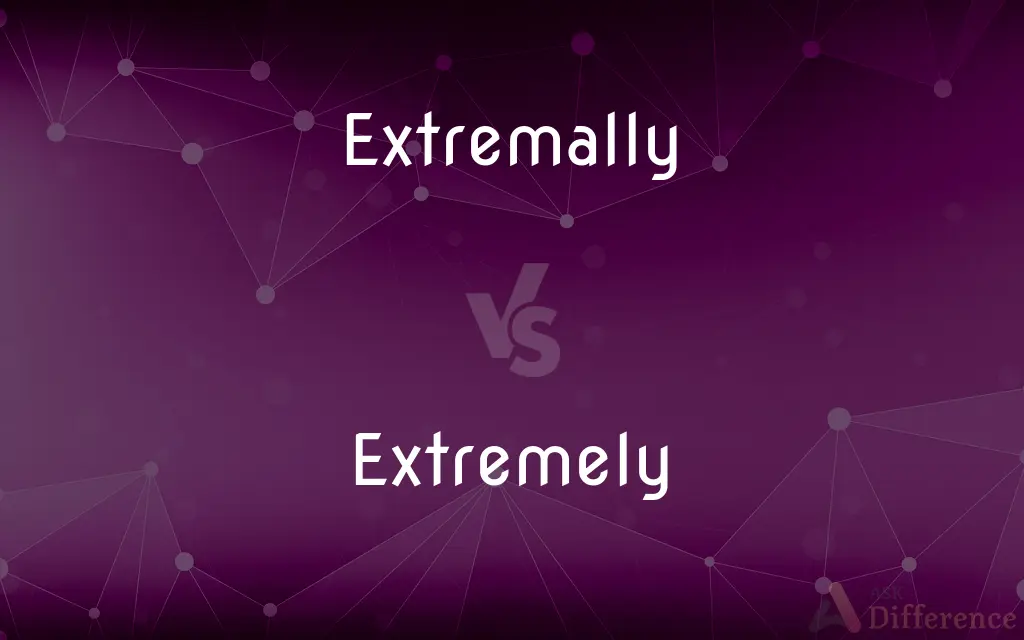Extremally vs. Extremely — What's the Difference?
By Urooj Arif & Maham Liaqat — Updated on March 25, 2024
Extremally refers to something relating to the extreme points or boundaries, while extremely denotes a very high degree of something.

Difference Between Extremally and Extremely
Table of Contents
ADVERTISEMENT
Key Differences
Extremally is often used in mathematics and geometry to discuss properties or points at the utmost boundaries of shapes or domains. Whereas extremely is an adverb used to emphasize a high degree of intensity, amount, or extent in various contexts.
Extremally can describe aspects that are at the outermost or limit of something, focusing on the spatial or conceptual boundaries. On the other hand, extremely is used in everyday language to intensify adjectives or other adverbs, indicating something is done to a great extent.
In technical discussions, especially in fields like topology or geometry, extremally signifies the critical points that define the scope or limit of a set. Extremely, however, is more about scaling the intensity or degree of qualities, without implying a boundary or limit.
Extremally is niche, primarily found in scientific or mathematical discourse, highlighting properties related to extreme values or boundaries of sets. Extremely is ubiquitous, applicable in a wide range of descriptive contexts to convey intensity.
While extremally relates to the notion of extremeness in a spatial or abstract boundary sense, extremely pertains to the degree or intensity of an action, quality, or condition, showing their application in different spheres.
ADVERTISEMENT
Comparison Chart
Usage
Mathematical and technical contexts, referring to boundaries or extreme points.
Common language, emphasizing a high degree of intensity or extent.
Meaning
Relating to the outermost points or limits of something.
Indicating a very high degree of something.
Context
Mostly used in scientific, especially mathematical, discussions.
Used in everyday speech and writing across various contexts.
Nature
Descriptive of spatial or conceptual boundaries.
Descriptive of intensity or degree.
Example
Extremally disconnected spaces in topology.
Extremely hot weather.
Compare with Definitions
Extremally
Pertaining to the utmost or extreme values in a given set.
The algorithm identifies extremally low points in the dataset.
Extremely
Denoting an exceedingly positive or negative quality.
The play was extremely entertaining.
Extremally
Involving the edges or extremities of a figure.
The extremally positioned points define the shape's outline.
Extremely
To a very great degree; highly or much.
The temperature is extremely cold today.
Extremally
Used in mathematics to describe properties at the outer limits.
This function is extremally sensitive to boundary conditions.
Extremely
Used to emphasize the intensity or severity of a condition.
He is extremely talented in music.
Extremally
Relating to the extreme points or boundaries.
The study focused on the extremally high curvature of the object.
Extremely
Expressing a high level of something.
The project was extremely challenging.
Extremally
Concerning the maximum or minimum possible values or conditions.
These are extremally rare circumstances in our observations.
Extremely
Indicating the utmost degree of a quality or state.
She was extremely pleased with the results.
Extremally
To an extremal extent
Extremely
To a very great degree; very
This is an extremely difficult thing to do
Extremely
Most remote in any direction; outermost or farthest
The extreme edge of the field.
Extremely
Being in or attaining the greatest or highest degree; very intense
Extreme pleasure.
Extreme pain.
Extremely
Being far beyond the norm
An extreme conservative.
Extremely
Of the greatest severity; drastic
Took extreme measures to conserve fuel.
Extremely
Characterized by severe, usually oxygen-poor environmental conditions.
Extremely
Having an affinity for such conditions
An extreme microorganism.
Extremely
Very dangerous or difficult
Extreme rafting.
Extremely
Participating or tending to participate in a very dangerous or difficult sport
An extreme skier.
Extremely
(Archaic) Final; last.
Extremely
The greatest or utmost degree or point.
Extremely
Either of the two things situated at opposite ends of a range
The extremes of boiling and freezing.
Extremely
An extreme condition.
Extremely
An immoderate, drastic expedient
Resorted to extremes in the emergency.
Extremely
The first or last term of a ratio or a series.
Extremely
A maximum or minimum value of a function.
Extremely
(Logic) The major or minor term of a syllogism.
Extremely
(degree) To an extreme degree.
Extremely
In an extreme manner or state; in the utmost degree; to the utmost point; exceedingly; as, extremely hot or cold.
Extremely
To a high degree or extent; favorably or with much respect;
Highly successful
He spoke highly of her
Does not think highly of his writing
Extremely interesting
Extremely
To an extreme degree;
Extremely cold
Extremely unpleasant
Extremely
To an extreme degree;
The house was super clean for Mother's visit
Extremely
To an extreme degree or extent;
His eyesight was exceedingly defective
Common Curiosities
Can extremally be used in everyday language?
Extremally is mostly used in mathematical or technical contexts and is less common in everyday language.
What makes something extremely important?
Something is extremely important if it holds a very high degree of significance or urgency.
Is extremally a common term outside of mathematics?
Extremally is not commonly used outside of scientific or mathematical discussions.
What does extremally mean?
Extremally refers to something related to the utmost points, boundaries, or extreme values of a set or domain.
Is extremely always related to positive attributes?
No, extremely can relate to both positive and negative attributes.
How is extremely used in a sentence?
Extremely is used as an adverb to emphasize a very high degree of something, e.g., "The task was extremely difficult."
How do extremally and extremely differ in application?
Extremally is used in specific technical or mathematical contexts, while extremely is broadly used across various subjects to denote intensity.
What kind of mathematical concepts use extremally?
Concepts like extremally disconnected spaces or extreme values in functions use extremally.
What role does extremely play in language expression?
It amplifies the degree of adjectives and adverbs, enhancing expressiveness in language.
Can a geometric shape be described as extremally defined?
Yes, in mathematical terms, a shape can have extremally defined points or boundaries.
Can extremely modify any adjective?
Extremely can modify most adjectives and adverbs to intensify their meaning.
Can a situation be described as extremally significant?
While technically possible, it's more appropriate to use "extremely significant" in general language for clarity.
Is it correct to use extremally in describing extreme sports?
No, extremally is not typically used in this context; "extremely dangerous" would be more appropriate for extreme sports.
What indicates extreme weather conditions?
Extreme weather conditions are indicated by highly unusual, severe, or unprecedented weather patterns.
How does extremally contribute to understanding spatial concepts?
It helps in identifying and discussing the outermost limits or critical points that define spatial boundaries.
Share Your Discovery

Previous Comparison
Era vs. Age
Next Comparison
Shocked vs. ShookAuthor Spotlight
Written by
Urooj ArifUrooj is a skilled content writer at Ask Difference, known for her exceptional ability to simplify complex topics into engaging and informative content. With a passion for research and a flair for clear, concise writing, she consistently delivers articles that resonate with our diverse audience.
Co-written by
Maham Liaqat















































